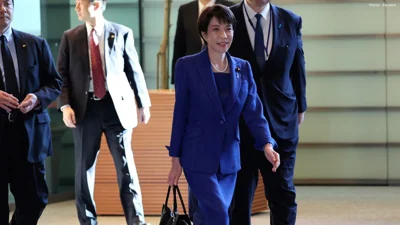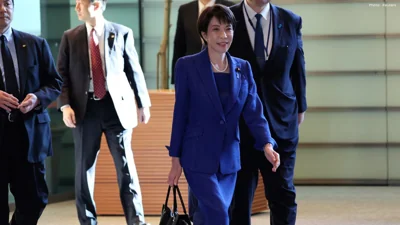
Post by : Monika
In a notable turn of events in French politics, the Socialist Party leader has publicly declared that they will vote against the current Prime Minister, Sébastien Lecornu. This announcement comes amid growing political tension and economic challenges in France. The decision highlights the deepening divisions within the French Parliament and raises questions about the stability of President Emmanuel Macron’s government.
Background on Prime Minister Sébastien Lecornu
Sébastien Lecornu was appointed as France’s Prime Minister by President Emmanuel Macron, with the goal of stabilizing the government and addressing urgent economic and social issues. Lecornu, who had previously held ministerial positions, is seen as a technocrat capable of navigating complex economic reforms. His appointment came at a time when the French government faced criticism over inflation, public spending, and social unrest.
Despite these credentials, Lecornu’s tenure has faced immediate scrutiny. Critics argue that his economic policies favor wealthy individuals and large corporations, leaving ordinary citizens with fewer opportunities.
Moreover, his appointment has not resolved the underlying political instability in France, as Macron’s party lacks a clear majority in Parliament, making governance more challenging.
Socialist Party’s Opposition
The Socialist Party (Parti Socialiste), historically one of France’s major political forces, has taken a firm stance against Prime Minister Lecornu. The party leader stated that they will vote against Lecornu in the upcoming parliamentary session. This opposition is rooted in several key concerns:
Economic Policies: The Socialist Party criticizes Lecornu’s economic agenda, claiming that it prioritizes the wealthy while failing to address the needs of the working class and middle-income families. Proposed reforms in taxation, corporate incentives, and labor regulations are viewed as favoring large businesses, potentially widening the wealth gap in the country.
Budgetary Concerns: The Socialists have also expressed alarm over the government’s approach to public spending. They argue that measures to reduce budget deficits and implement austerity policies could harm essential public services, such as healthcare, education, and social welfare programs. The party fears that citizens may face higher costs while public support systems weaken.
Political Instability: France has witnessed frequent changes in government leadership over recent years. The Socialist Party points to the rapid turnover of prime ministers as a sign of instability, questioning the government’s ability to provide consistent and effective governance. This political uncertainty has fueled public dissatisfaction and has contributed to protests and demonstrations in various parts of the country.
Parliamentary Dynamics
The Socialist Party’s vote against Prime Minister Lecornu is significant because of its potential impact on parliamentary dynamics. France’s Parliament is currently fragmented, with no single party holding a clear majority. This means that Lecornu’s government relies on alliances and support from multiple parties to pass legislation.
With the Socialists firmly in opposition, passing laws may become more difficult. Key legislative proposals, including economic reforms, budget approvals, and social policies, could face delays or even rejection. This opposition strengthens the influence of other parties, such as far-left and far-right factions, who may use the situation to push their own agendas.
The parliamentary vote is also symbolic, highlighting the lack of consensus on crucial issues. Even if Lecornu survives the vote, the opposition demonstrates the depth of political disagreement and sends a clear message that the government must engage in dialogue and compromise to govern effectively.
Public Perception and Social Implications
The Socialist Party’s stance is likely to influence public opinion in France. Ordinary citizens may see the vote as a reflection of their concerns about economic inequality and government inefficiency. Protests or demonstrations could arise in response to perceived injustices or unpopular government measures.
The opposition also has the potential to polarize public discourse. Citizens may become divided along political lines, supporting either the government’s reforms or the Socialists’ calls for change. This division can affect social cohesion and make it more difficult for the government to implement policies that require broad public acceptance.
Potential Outcomes of the Opposition
Although the Socialist Party’s vote may not immediately remove Prime Minister Lecornu, it has several potential consequences for French politics:
Stronger Debate in Parliament: The opposition will force robust discussions on key economic and social issues, compelling the government to justify its policies in detail.
Policy Adjustments: Facing resistance, Lecornu’s administration may be forced to adjust economic and social policies to gain broader support, potentially altering tax proposals, labor reforms, and public spending plans.
Political Deadlock: Persistent opposition could result in legislative gridlock, where crucial laws and reforms are delayed, slowing down governance and creating uncertainty for citizens and businesses.
Call for Snap Elections: In extreme cases, continued opposition and instability could prompt discussions about calling snap parliamentary elections to resolve political deadlock. This would allow voters to express their preferences directly but could also prolong uncertainty in the short term.
Impact on President Macron: The opposition not only challenges Prime Minister Lecornu but also reflects on President Macron’s leadership. A weakened government may reduce Macron’s political leverage domestically and internationally, affecting France’s role in the European Union and global affairs.
Broader Political Context
France’s political landscape has changed significantly in recent years. Traditional parties, such as the Socialist Party and the center-right Republicans, have lost some influence, while far-right and far-left factions have gained ground. This shift has led to a more fragmented Parliament, making coalition-building essential for passing legislation.
The country is also dealing with economic challenges, including inflation, high energy costs, and the need for labor reforms. These issues have heightened public scrutiny of government policies and increased political tensions. The Socialist Party’s opposition to Lecornu represents both a critique of policy and a response to public dissatisfaction with the government’s handling of economic matters.
Economic Considerations
Political Stability and Governance
Political stability is essential for effective governance. France’s history of frequent government changes has contributed to uncertainty, affecting both domestic policies and international relations. The Socialist Party highlights that a stable government is necessary to implement long-term strategies, particularly in areas like economic reform, climate policy, and social welfare.
The opposition vote against Lecornu emphasizes the need for compromise and dialogue in a fragmented Parliament. Without cooperation, legislative processes may stall, creating obstacles to addressing pressing national issues.
International Implications
France plays a significant role in the European Union and global affairs. Political instability and government opposition can affect the country’s ability to negotiate in international forums, including trade agreements, climate negotiations, and EU policymaking.
The Socialist Party’s stance may also influence how France engages with other EU member states. A weakened government could face challenges in promoting its agenda at the EU level, potentially affecting the country’s influence on regional policies and international collaborations.
The Socialist Party’s decision to vote against Prime Minister Sébastien Lecornu highlights the complexities and challenges facing France’s government. While the vote may not remove him from office, it sends a strong message about dissatisfaction with economic policies, public spending, and political instability.
This political opposition reflects broader trends in French society, including growing concerns about inequality, the effectiveness of government policies, and the need for social protections. As the government navigates these challenges, it must balance economic reforms with social equity while maintaining political stability.
The coming weeks will be crucial for Prime Minister Lecornu and President Macron. How they respond to parliamentary opposition, public criticism, and social concerns will shape the future direction of France. Effective leadership, dialogue, and compromise will be essential to ensure that the government can implement its policies successfully and maintain public trust.
In summary, the Socialist Party’s opposition vote is more than a parliamentary procedure—it is a reflection of the economic, social, and political tensions that define contemporary France. The outcome of this vote and the government’s response will have long-lasting implications for both domestic governance and France’s role in international affairs.










Mattel Revives Masters of the Universe Action Figures Ahead of Film Launch
Mattel is reintroducing Masters of the Universe figures in line with its upcoming film, tapping into

China Executes 11 Members of Criminal Clan Linked to Myanmar Scam
China has executed 11 criminals associated with the Ming family, known for major scams and human tra

US Issues Alarm to Iran as Military Forces Deploy in Gulf Region
With a significant military presence in the Gulf, Trump urges Iran to negotiate a nuclear deal or fa

Copper Prices Reach Unprecedented Highs Amid Geopolitical Turmoil
Copper prices soar to all-time highs as geopolitical tensions and a weakening dollar boost investor

New Zealand Secures First Win Against India, Triumph by 50 Runs
New Zealand won the 4th T20I against India by 50 runs in Vizag. Despite Dube's impressive 65, India

BTS Tour Sparks Global Demand: Mexico Appeals for Additional Shows
BTS' comeback tour creates immense demand in Mexico, prompting President Sheinbaum to urge more conc